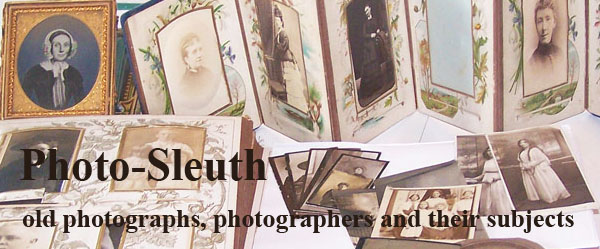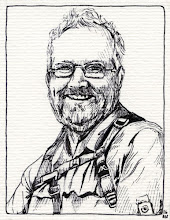
Reverend Roseingrave Macklin, 1862
Carte de visite portait by James Brennen, Derby
Image © and courtesy of Nigel Aspdin
When Roseingrave Macklin arrived in Derby in 1835 with wife Jane Ann and six daughters he was already in his forties. He had taken Holy Orders in his home town of Dublin - where his father Gerard Macklin (1767-1848) was state surgeon of Ireland - and held a living as Rector of Newcastle, in the county of Wicklow, for some years.

Church of Ireland church at Lusk, Co. Dublin, 2010
© Copyright Kieran Campbell and licensed for reuse under this Creative Commons Licence
Immediately prior to his move to England, Macklin had been the vicar of Lusk, north of Dublin, and was instrumental in the establishment of a Protestant church-based school in the nearby town of Rush [2]. He also appears to have been an active participant in the "no-Popery" movement. In late 1828, following agitation by Daniel O'Connell and the Catholic Association, a proposal was made to legislate for the right of Catholics to enter the British parliament. In response, a significant number of well-heeled Irish Protestants initiated a large scale campaign, forming the Brunswick "constitutional" clubs as part of a thinly disguised attempt at a Populist movement against the political reforms [3].

Sir Francis Burdett, Joseph Hume & Daniel O'Connell celebrating Catholic Emancipation, 1834
Drawing by John Doyle, courtesy of Spartacus Educational
Macklin was present at a meeting for the purpose of establishing a Brunswick Club for the baronies of Rathdowne and Newscastle at Newtown-Mountkennedy in October 1828 [4], where he made the following inflammatory contribution:
Can any man of common sense come forward and tell me that the Protestants of Ireland are to lie down and be trodden under foot, or be led like lambs to the sacrifice? ... I would entreat of you to preserve that constitution inviolate and inviolable, which your ancestors sacrificed so much to obtain. They handed it down to you - you have another duty to perform, to hand it down to your posterity unaltered and glorious as it has ever been.Despite the efforts of the Brunswicks at scaremongering, attempting to incite a fear of Catholic ascendancy and eventual home rule, the government of the Duke of Wellington succeeded in passing the Emancipation legislation in 1829. Continued resentment by the general population of Ireland against the payment of tithes to the Church of Ireland resulted in the Tithe War of the early to mid-1830s.

St Werburgh's Church, Derby, c.1833 [5]
This was the political backdrop at the time of Rev. Macklin's move from Dublin to Derby, although his reasons for leaving the land of his birth are unknown. In 1832 he purchased some land in Derby [6], and three years later he settled in the town, having been made curate of St Werburgh's church under Rev. Edward Unwin [1]. Unwin was a wealthy Derby resident, for whom the Grade II listed Regency villa Highfield House - featured previously on Photo-Sleuth, here - was built by Richard Leaper in 1827. Macklin was performing duties at St Werburgh's by 19 August 1835 [7].

Christ Church, Derby, 13 June 2011
Image © and courtesy of Nigel Aspdin
By 1841 he had impressed his superiors sufficiently to be appointed to the incumbency of Christ Church situated near the junction of Normanton and Burton Roads, and presumably a step up in the clergical heirarchy.
The new position did not prevent Rev. Macklin from pursuing his anti-Catholic mission. Freeman's Journal and Daily Commercial Advertiser (Dublin) published an article in July 1839 discussing reactions to the "no-popery cry," which included a letter from Sir George Harpur Crewe, former Sherriff of Derbyshire, and at the time M.P. for South Derbyshire [8]. The letter was written in response to a request from Henry Cox, secretary of the Protestant Association, and Macklin, and declined an invitation to assist in the formation of a local branch:
I have never attended any of the meetings at Exeter-hall of this association, because, whatever be their inention, I cannot approve of their practice. the sole object appears to me to be the most violent abuse of the Roman Catholics ... I neither like the tone nor spirit of the speeches delivered by the great Irish speakers on these occasions. There is too much of human temper, and far too little of Christian love to please me.One wonders whether Macklin approved of the marriage of daughter Jemima to Harpur Crewe's nephew Arthur Godley Crewe (1831-1894) in 1861 [9]. Perhaps the intervening two decades had tempered Macklin's views somewhat, although it seems unlikely. In 1843 Macklin was in the news again, welcoming a former "Romish priest" of the Dominican order to his congregation at Christ Church [10]. Then in January 1851, at a meeting of the Foreign Aid Society [11], he remarked:
... that the Protestantism of the people of this country had lately been evoked to a remarkable extent, and he sincerely hoped it would ... strengthen them in their determination to carry out the principles of their religion which were essentially antagonistic to Popery.

The Macklin residence, Wardwick, Derby, 13 June 2011
Image © and courtesy of Nigel Aspdin
The Macklin family lived at what was then number 14 Wardwick, on the south-west corner with Becket Street, Rev. Macklin owning much of the land to the west of Green Lane, which was largely undeveloped when they first arrived in Derby. At that time (1835) they had six daughters: Martha R. (1823-1905), Charlotte R. (1825-1863), Georgina (1828-1913), Sophia (1830-1887), Rosina Margaret (1831-1884) and Jemima (1832-1916), all born in Ireland. A seventh daughter Frances Arabella (1838-1885) and, finally, a son Gerard Roseingrave Wilson (1843-1896) were born after their arrival in Derby. Although five of their eight children died unmarried, three daughters did marry and produced, in turn, eight grandchildren.
Martha Macklin married another clergyman Arthur Charles Pittar (1827-1899), variously curate of Alfreton (Derbyshire), vicar of Ashton Hayes (Cheshire), vicar of Holy Trinity Trowbridge (Wiltshire) and rector of Melmerby (Cumberland). Georgina Macklin married iron master and colliery owner Charles Henry Oakes (1826-1906) from Riddings, near Alfreton, Derbyshire. Jemima Macklin married Alfred Godley Crewe (1831-1894) (son of the Rector of Breadsall), a physician and surgeon for the Madras Army in India, and later of Portsea, Hampshire.
Roseingrave Macklin remained the incumbent of Christ Church for over twenty years, resigning because of poor health in 1862. In an obituary published in The Derby Mercury [1], his religious views gained a prominent mention:
Like most of the Irish clergy holding similar opinions, he was an indefatigable opponent and denouncer of the errors of Romanism, and was actively engaged in every movement which had for its object the defence of the Protestant Church, or aggression on the Romish, particularly in his native land.Perhaps the most enduring of Reverend Macklin's legacies to the town of Derby are Macklin Street and Wilson Street, in the area to the south-west of the city centre. Wilson was also a family name. It may be that there are other surviving Macklin remnants, for example perhaps some reminders of his tenure at All Saints. If you are aware of any, please let me know and I'll add them to this article.
In a future article, I will discuss the carte de visite portrait itself, where it came from, and the circumstances under which it may have been taken.
References
[1] The Late Mr. Macklin, in The Derby Mercury (Derby, England), 22 November 1865.
[2] Address to the Rev. Roseingrave Macklin, late Vicar of Lusk, in The Derby Mercury (Derby, England), 3 June 1835.
[3] Phylan, Alan (2004) The Brunswick Clubs: Rise, Contradictions & Abyss, The Old Limerick Journal, v. 40, pp. 25-34.
[4] Brunswick Clubs: Meeting at Newtown-Mountkennedy (From the Dublin Evening Mail), in The Standard (London, England), 29 October 1828.
[5] Glover, Stephen (1833) The History and Gazetteer of the County of Derby.
[6] Derby Improvement Act, in The Derby Mercury (Derby, England), 9 May 1832.
[7] Marriages, in The Derby Mercury (Derby, England), 19 August 1835.
[8] The No-Popery Cry, Freeman's Journal and Daily Commercial Advertiser (Dublin, Ireland), 18 July 1839.
[9] Marriage of Alfred G. Crewe, Esq, and Miss Jemima Macklin, in The Derby Mercury (Derby, England), 3 July 1861.
[10] Conversion of a Roman Catolic Priest, in The Derby Mercury (Derby, England), 9 September 1843.
[11] Foreign Aid Society, in The Derby Mercury (Derby, England), 15 January 1851.








interesting fellow!!
ReplyDeletelove the old pics, especially "all saints". i looked at the white house, i found it pretty if a bit modest, but i figure the price tag is not as modest...
:D~
HUGZ
Thanks TB - The All Saints print is from my own collection, and I was particularly pleased with that purchase. Pity the house is somewhat spoilt by having a fish and chips shop and a grill below. I friend who lives nearby is going to see if he can take some better photos and dig up some more about its history. I'm sure the price tag would NOT be modest.
ReplyDeleteSorry, had to change the old All Saints image for a modern one of Christ Church - I had the churches mixed up! I'll have to use the All Saints one in a future article.
ReplyDelete